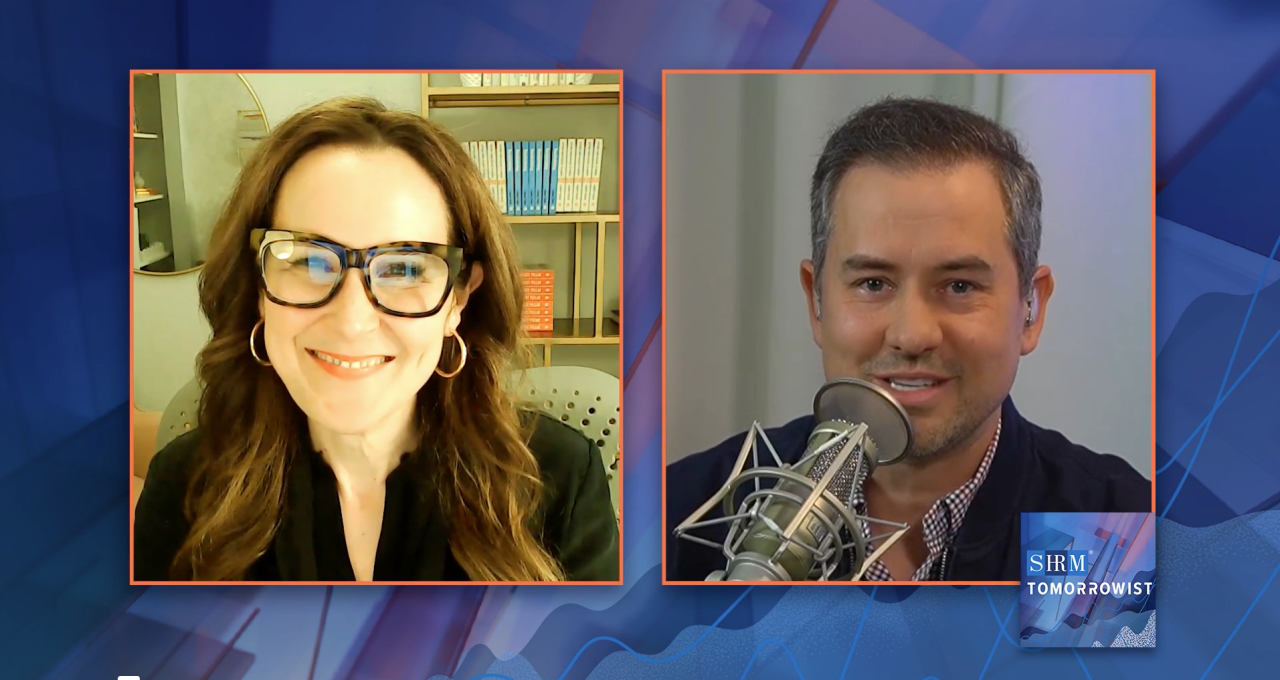Multi-generational workplace expert Lindsey Pollak recently joined SHRM’s Tomorrowist podcast to discuss how leaders can navigate the challenges of managing seven generations in the workplace.
It seems that every week, executives are met with new reports on how different generations prefer a certain workplace arrangement or management style. These constantly shifting goalposts are due to a conflation of values, technology, and education that shape each generation and subsequently influence today’s workplace. Yet Lindsey Pollak, an expert on multi-generational workplaces and author of The Remix (Harper Business, 2019), points out that beneath the surface, the core values of each generation are more alike than they may initially appear.
In her book, Pollak conducted a comprehensive deep dive into the fast-approaching multi-generational workplace, where seven generations will be working together for the first time. “The reason is not because young people keep coming in ... it’s because people are working a lot longer into their lives,” she explained on Tomorrowist. This dynamic requires leaders to cultivate skills for managing diverse age groups, but improvement is more straightforward than one might imagine. Pollak suggests that great managers are great for every generation.
“Really good managers say, ‘I can manage anybody, I’m just going to have to adapt my style to understand them,’ ” said Pollak, noting that great managers can manage anyone, no matter their generation or background. “The biggest tip that I ever give when people say, ‘If there’s one thing you could change,’ [is] just spend time with people of the generation you find most challenging.” Pollak likened this dynamic to familial relationships where age is secondary to shared values.
As the workforce enters what many consider a leadership crisis, her advice is timely and offers a simple yet powerful reminder: Navigating a multi-generational workplace starts with communication and understanding.
Why ‘Command-and-Control’ No Longer Works
Pollak noted how generational shifts and the evolution of the workplace are compounding the problem. “Humans haven’t changed. I think our willingness to adapt to different ways of working has changed,” she explained. Pollak added that a key challenge is that today’s workers are less receptive to the traditional command-and-control style of leadership, which is now often considered militaristic.
“It was kind of easy to manage in the command-and-control style. I tell you what to do, you do it. I don’t really care what you think,” said Pollak. “What I think has changed is, we are much more open to all these different ways of being.” She explained that workers from younger generations are well-acquainted with diverse cultural opportunities and are quick to seek out workplaces that align with their values and lifestyle.
Leadership Gaps and Training Deficiencies
Pollak believes insufficient training and a disconnect from academia are worsening the leadership crisis. “Fifty-eight percent of managers are getting zero leadership training. Sixty-four percent of Millennials don’t feel prepared to lead,” she said. While one might expect these statistics to prompt companies to invest in leadership training or advocate for improved academic programs, Pollak said that “3% of companies are investing in upskilling.” Identifying a major breakdown, she pointed out that “96% of academia says they’re preparing students, and 11% of business leaders say they’re not preparing anybody.”
While more training and stronger partnerships with academic institutions are essential, leaders can make a significant impact on workplace culture with one simple step: implementing clear guidelines and training programs to bridge the gap between education and workplace expectations. Pollak emphasized that what many leaders consider common sense for employees no longer is. “Whenever you hear anyone call anything an ‘unwritten rule,’ I want a big red flashing light to go off,” she said, addressing executives. “Somebody isn’t going to know that. Anything you think is obvious, just write it down—not word for word—but [as] guidelines.” Different generations have vastly different understandings of common sense. As a result, well-intentioned employees may unintentionally make mistakes that appear poorly motivated.
Workplace Flexibility and Customization
Pollak emphasized that flexibility and customized benefits foster satisfaction across age groups. She shared examples of companies allowing employees to choose how they allocate benefits—toward student loan repayment, retirement contributions, or both.
“You take away your own judgment that some choices are right or wrong,” said Pollak. “If you have paid leave for a loved one, that could be a child, that could be an elder, that could be a partner, that could be a pet.” She said employees want flexibility to address life’s difficulties and challenges, and she encouraged leaders to approach these decisions with openness, rather than bias. “I’m starting to see people say, ‘Oh, I get it now. It’s the choice. It’s the flexibility. But I can’t judge how people use that,’ ” said Pollak. However, she cautioned against unlimited flexibility, noting there need to be limits and clear boundaries.
“Much of this comes down to communication, listening, and being a little bit flexible and open,” said Pollak. “I say it’s about curiosity, clarity, and connection. And if you can get those three things right, you can probably work with people of any generation.”
Was this resource helpful?




